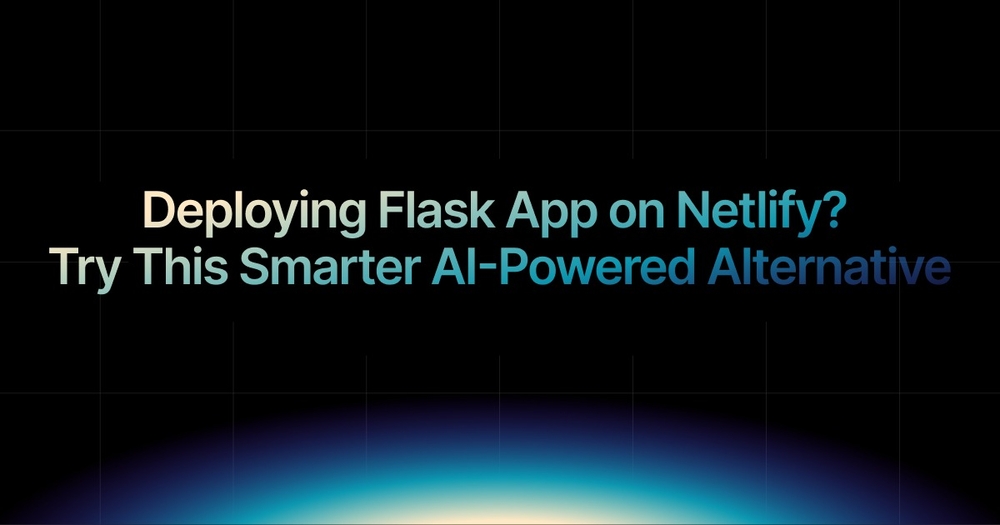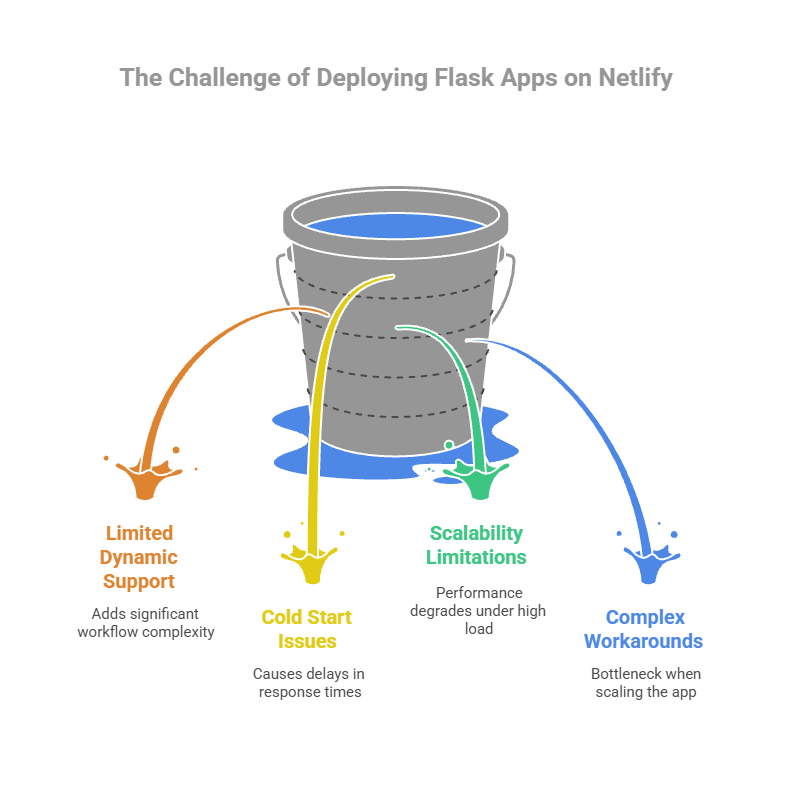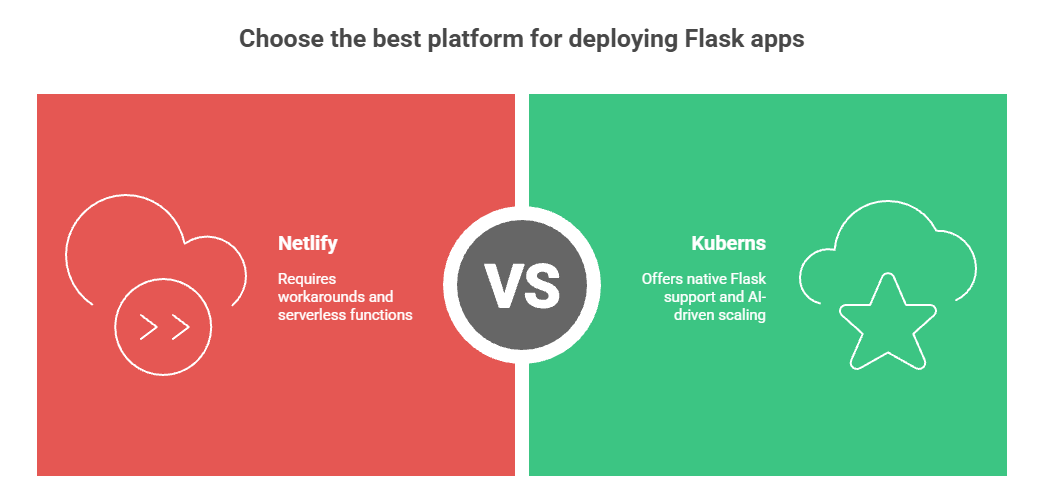Published
- 15 min read
Deploying Flask App on Netlify? Try This Smarter AI-Powered Alternative.

If you’re searching for how to deploy a Flask app on Netlify, the short answer is yes, it can be done. Developers have used workarounds like Netlify Functions or adapters to make Flask projects run. For quick demos or small experiments, this approach might be enough.
But here’s the catch: Flask is a backend framework, while Netlify was built primarily for frontend and static site hosting. That means once your app grows beyond a small test project, you’ll likely hit challenges around scaling, performance, and monitoring.
If you’ve been running into scalability issues, dealing with complex configurations, or facing cold start problems while deploying Flask on Netlify, there’s a smarter solution.
An AI-powered deployment can simplify your workflow and take the frustration out of hosting Flask apps.
In this blog, we’ll show you how an AI-driven alternative can make deploying your Flask app not only easier but also more efficient.
The Challenge of Deploying Flask Apps on Netlify

At first, trying to deploy a Flask app on Netlify seems like an obvious choice due to its popularity in the developer community.
Netlify makes frontend hosting effortless, so many developers assume the same will apply for Python or Flask projects. But Flask isn’t a natural fit for Netlify’s JAMstack-first architecture. Instead of straightforward deployment, you often need to add workarounds.
Here are the common challenges developers face when attempting Flask deployment on Netlify:
- Limited Support for Dynamic Applications: Netlify is primarily designed to serve static sites, meaning it doesn’t natively support dynamic frameworks like Flask. While it’s possible to deploy Flask apps using serverless functions or containers, these solutions can add significant complexity to your workflow. This results in long configuration times and additional steps that can be frustrating for developers who simply want to get their app live.
- Cold Start Issues: One common issue with deploying Flask apps on Netlify using serverless functions is the cold start problem. Every time a function is invoked after a period of inactivity, it has to “warm up,” causing delays in response times. This is especially problematic for production environments, where speed and reliability are essential.
- Scalability and Performance Limitations: Netlify’s serverless model can also present scalability issues when handling high traffic. Since the infrastructure is abstracted away, you have little control over how resources are allocated to your app. This can cause performance degradation under high load or during peak usage times.
- Complex Workarounds: To make Flask work on Netlify, developers often resort to complicated workarounds, such as deploying via Docker containers, setting up serverless frameworks, or adjusting configurations manually. These Netlify Flask limitations can quickly become a bottleneck, especially when you’re focused on building and scaling your app, not configuring deployment systems.
👉 You may also like: Best Netlify Alternatives
The Smarter, AI-Powered Alternative to Netlify
 While deploying Flask apps on Netlify can be a challenge, there is a smarter, AI-powered alternative that eliminates the need for complex configurations and workarounds. With Kuberns, you can deploy your Flask app quickly, easily, and with far less hassle than on Netlify.
While deploying Flask apps on Netlify can be a challenge, there is a smarter, AI-powered alternative that eliminates the need for complex configurations and workarounds. With Kuberns, you can deploy your Flask app quickly, easily, and with far less hassle than on Netlify.
Kuberns is an AI-powered deployment platform built to handle frameworks like Flask without the extra steps. Instead of forcing Flask into a frontend-first workflow, Kuberns gives you a backend-native environment where your app just runs.
Here’s what makes it different from a typical Flask deployment on Netlify:
AI-Driven Deployment for Flask Apps
On Netlify, deploying Flask typically means extra steps like containerising your app or configuring serverless functions. With Kuberns, this complexity disappears. The platform leverages AI to automatically detect your Flask stack, configure environments, and deploy your app correctly the first time.
- Auto-Configuration: From environment variables to database connections, Kuberns sets up everything your Flask app needs, no serverless workarounds or YAML files.
- Native Flask Hosting: Unlike Netlify, which forces Flask into a serverless model, Kuberns provides native support for backend apps.
Dedicated Infrastructure, No Serverless Hassles
Flask thrives on dynamic infrastructure, not serverless cold starts. Kuberns runs your app on dedicated AWS infrastructure that’s always ready, ensuring smooth performance and flexible scaling and does it at 40% lower cost thanks to AI-driven resource optimisation.
- End-to-End Management: Kuberns handles the entire deployment lifecycle, build, deploy, scale, and monitor, without requiring developers to manage serverless complexity.
- Production Reliability: Your app isn’t limited by serverless timeouts or hidden scaling ceilings.
AI-Powered Auto-Scaling for Flask Apps
One of the biggest challenges with Flask deployment on Netlify is handling traffic spikes. Serverless cold starts mean users often wait longer during surges. With Kuberns, scaling is instant and automatic.
- Instant Scaling: Kuberns’ AI continuously monitors CPU, memory, and traffic, scaling resources in real time.
- No Cold Starts: Apps are always on, ensuring fast response times, whether your app has 10 users or 10,000.
Real-Time Monitoring and Optimisation
Deployment doesn’t end once your app is live. Maintaining reliability is just as important.
Netlify offers limited visibility into backend apps, but Kuberns gives you full observability and continuous optimisation.
- AI-Driven Monitoring: Kuberns checks app health, usage patterns, and server load to detect issues early.
- Self-Optimisation: The platform can auto-adjust resources, optimise queries, and fine-tune performance, keeping your Flask app running at its best without manual intervention.
With Kuberns, you don’t just deploy, you deploy smarter.
Instead of patching Flask into a serverless-first system like Netlify, you get a platform that understands your backend framework, cuts AWS costs by 40%, and handles scaling, monitoring, and optimisation for you.
👉 Related reading: Deploy Node.js on Netlify and Why Kuberns Is a Smarter Choice
Why Kuberns is Easier Than Netlify?
 Deploying a Flask app on Netlify usually means spending extra time configuring serverless functions, setting up workarounds, and dealing with cold starts.
Deploying a Flask app on Netlify usually means spending extra time configuring serverless functions, setting up workarounds, and dealing with cold starts.
This can be overwhelming for developers, especially when your main focus should be building the application, not battling with deployment configurations.
With Kuberns, the process is designed around backend frameworks from the start. That’s what makes it easier, faster, and more reliable for Flask developers.
No Workarounds, Just Native Flask Support
On Netlify, Flask runs indirectly through serverless functions, which often require containerization or complex adapters. Kuberns eliminates this entirely. It natively supports Flask, so you can connect your GitHub repo and deploy without additional configuration.
Always-On Infrastructure (No Cold Starts)
Netlify’s serverless model introduces cold start delays whenever your app hasn’t been used for a while. This may be acceptable in a demo, but for production, it hurts user experience. Kuberns runs your app on dedicated, always-on AWS infrastructure, so your Flask app is instantly responsive every time.
AI-Powered Scaling Without the Complexity
Scaling Flask apps on Netlify can be unpredictable due to serverless timeouts and function limits. Kuberns uses AI-driven auto-scaling to continuously monitor performance and instantly allocate resources. Whether traffic doubles or spikes overnight, your app scales automatically with no manual intervention.
Built-In Logs, Monitoring, and Alerts
Debugging Flask apps on Netlify is challenging due to limited server-side visibility. Kuberns makes this easier by giving you real-time logs, application monitoring, and automated alerts out of the box, so you spend less time guessing and more time coding.
Smarter Cost Efficiency
Netlify’s pricing is attractive for static sites, but costs can escalate once you start pushing backend workloads. Kuberns optimises AWS usage with AI, lowering infrastructure expenses by up to 40% while still providing enterprise-grade performance.
👉 You might also read: Netlify vs Heroku Vs Kuberns: Which Deployment Tool Is the Best?
Comparing Flask Deployment on Netlify vs. Kuberns
When deciding where to deploy a Flask app, many developers consider Netlify first because of its popularity in frontend hosting.
However, Flask is a backend framework, and that’s where Netlify’s limitations show up. Kuberns, on the other hand, is purpose-built to support backend apps with AI-powered deployment and infrastructure.
Here’s a clear breakdown of how the two compare for Flask developers:
| Feature / Capability | Netlify (for Flask) | Kuberns (for Flask) |
|---|---|---|
| Framework Support | Not native; requires serverless functions or workarounds | Native Flask detection, auto-build, and direct deployment |
| Deployment Setup | Manual configs, containerization, or adapters needed | Zero-config deployment from GitHub with AI auto-setup |
| Infrastructure | Serverless functions (frontend-first) | Dedicated AWS infrastructure optimized by AI |
| Scaling | Limited; cold starts and serverless timeouts | AI-powered auto-scaling with no cold starts |
| Monitoring & Debugging | Limited backend logs and visibility | Full logs, real-time monitoring, and automated alerts |
| Performance | Prone to latency during inactivity | Always-on, production-grade performance |
| Cost Model | Good for static sites; backend costs can escalate | AI optimizations reduces AWS spend by up to 40% |
| Best Use Case | Static sites, JAMstack apps, frontend projects | Flask, Django, Node.js, and production-ready backend apps |
Kuberns clearly stands out as the easier, more efficient choice for Flask deployment.
Whether you’re a beginner or an experienced developer, Kuberns removes the complexity of Netlify Flask hosting and provides a hassle-free, AI-powered solution that ensures optimal performance and scalability.
Benefits of Using Kuberns for Deployment
Whether you’re working with Flask, Node.js, or any other modern web framework, Kuberns provides features that significantly improve the deployment workflow and offer cost savings compared to traditional platforms like Netlify.
These benefits go beyond Flask and highlight why developers and teams are switching to AI-powered deployment.
1. One Platform for All Frameworks
Kuberns isn’t limited to Flask. It supports Python, Django, Node.js, React, and more, making it easier to manage projects that use multiple stacks without juggling different hosting providers.
2. Zero Platform Fees
Unlike many deployment tools that add hidden platform costs on top of infrastructure, Kuberns has no platform fees. You only pay for what you actually use, which already reduces significant costs through AI optimisation.
3. 40% AWS Savings Built-In
By default, Kuberns deploys apps on AWS infrastructure and applies AI-driven optimisations to reduce waste. This results in an average 40% cost reduction compared to managing AWS directly, without any manual tuning required.
4. Multiple Environments Made Simple
Managing staging, testing, and production environments is often complicated on other platforms. Kuberns makes it easy to spin up isolated environments with a click, giving teams flexibility to test changes safely before going live.
5. Built-In Security and SSL Certificates
Every app deployed on Kuberns comes with free SSL certificates and secure configurations by default. That means you don’t have to manage certificates manually or worry about unsafe defaults.
6. Centralised Dashboard for Logs and Monitoring
Instead of piecing together monitoring tools, Kuberns gives you a unified dashboard for logs, performance metrics, and alerts. This reduces the toolchain sprawl that teams often face when managing cloud apps.
7. Developer-Friendly Workflow
From auto-detecting your stack to setting up CI/CD without YAML files, Kuberns prioritises simplicity. You push your code, and Kuberns handles build, deployment, scaling, and monitoring in the background.
Ship Flask Apps Faster With the Smarter Option
Yes, you can deploy a Flask app on Netlify, but the experience often comes with serverless workarounds, cold starts, and limited backend support. Netlify is excellent for static sites, but Flask deserves a platform built for dynamic applications.
That’s where Kuberns comes in. With AI-powered deployment, always-on AWS infrastructure, real-time monitoring, and up to 40% lower cloud costs, Kuberns makes backend deployment as easy as hosting a static site, but without the compromises.
Instead of spending hours configuring, debugging, or scaling your Flask app, you can deploy in minutes, scale automatically, and manage everything from one simple dashboard.
If you’re ready to deploy your Flask app with Kuberns, and enjoy a seamless, AI-powered deployment experience!
Deploy smarter today. Get started with Kuberns and ship your Flask apps without the hassle.

People Also Ask
1. Can you deploy a Flask app on Netlify?
A: Yes, you can deploy a Flask app on Netlify, but it requires using serverless functions or Docker containers, which can be cumbersome and time-consuming. These configurations often result in issues like cold starts and limited flexibility, especially for dynamic apps.
2. Why is deploying Flask on Netlify so difficult?
A: Deploying Flask on Netlify is challenging due to its focus on static sites and reliance on serverless functions. These limitations often lead to performance issues like cold starts and require complex configurations, making deployment less straightforward.
3. What is a better alternative to deploying Flask on Netlify?
A: Best alternative for Netlify is Kuberns, which supports Flask apps natively and offers a seamless, AI-powered deployment process. Unlike Netlify, Kuberns eliminates cold starts, provides easy scaling, and ensures faster deployments.
4. How do I deploy a Flask app more easily?
A: To deploy a Flask app more easily, use Kuberns, which simplifies the process with native support for Flask. Kuberns handles everything from infrastructure to scaling, ensuring your app is up and running without complex configurations.
5. Can Kuberns handle high traffic for Flask apps?
A: Yes, Kuberns automatically scales your Flask app based on real-time traffic, ensuring smooth performance even during traffic surges. Unlike Netlify, it doesn’t rely on serverless functions, so you won’t face cold start delays.
6. What are the cost benefits of using Kuberns over Netlify for Flask apps?
A: With Kuberns, you pay only for the resources used, rather than incurring unpredictable costs with Netlify’s serverless functions. This makes Kuberns a more cost-efficient option, especially when scaling applications.
7. Is Kuberns good for Flask and other web frameworks?
A: Yes, Kuberns supports Flask as well as other web frameworks like Node.js and Django, making it a versatile platform for all types of dynamic applications. Its AI-driven infrastructure ensures efficient scaling and performance.
8. How long does it take to deploy a Flask app on Kuberns?
A: Deploying a Flask app on Kuberns takes just a few minutes. The platform automates most of the deployment process, meaning you can quickly get your app up and running with minimal effort.
9. Can Kuberns scale Flask apps automatically?
A: Yes, Kuberns provides AI-powered auto-scaling, adjusting your app’s resources based on traffic demands. This ensures optimal performance without needing manual intervention or complex configurations.